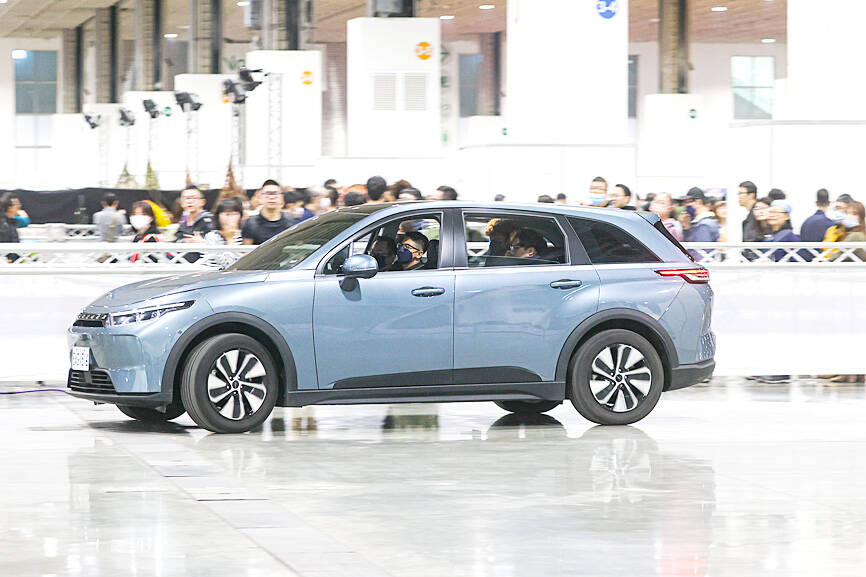Yulon Motor Co (裕隆汽車) yesterday released a positive growth projection for revenue this year, thanks to increasing shipments of its first electric vehicle (EV) model based on the MIH Open EV Platform developed by Hon Hai Precision Industry Co (鴻海精密), also known as Foxconn.
Yulon started shipping the electric sports utility vehicle Luxgen n7 earlier this year with shipments totaling 500 units in the first quarter, Yulon Motor spokesman Steven Lo (羅文邑) told investors during a virtual conference.
“In March and April, we expedited shipments to 1,200 to 15,000 units a month,” Lo said. “With higher shipments from the second quarter, we expect to complete the 9,000 Luxgen n7s in preorders by the third quarter.”

Photo: CNA
Yulon manufactures the electric vehicle while its subsidiary, Luxgen Motor Co (納智捷汽車), sells it. Luxgen has received about 20,000 n7 preorders since September 2022 and plans to accept second-wave orders from next month or June, Lo said.
Luxgen n7 is designed and based on the Model C EV developed by Foxtron Vehicle Technologies Co (鴻華先進), a joint EV venture between Hon Hai and Yulon.
“We are positive about the company’s revenue outlook, with Luxgen n7 being a major highlight of the year,” Lo said.
He said Yulon and Luxgen are discussing plans to introduce new EV models later this year, but did not elaborate.
Hon Hai last month said the new-generation Model B electric car, also designed by Foxtron, would be ready for mass production and open for preorders at the end of this year.
Regarding speculation that Yulon might distribute Chinese EVs made by BYD Co (比亞迪) and Chery Automobile Co (奇瑞汽車) in Taiwan, Lo said the company does not rule out any possibility of making vehicles for other brands, but has no substantial plans to partner with Chinese companies.
Yulon’s consolidated revenue last year expanded 6.54 percent to NT$82.12 billion (US$2.53 billion) from NT$77.08 billion in 2022, partly helped by its auto financing business operated by another subsidiary, Taiwan Acceptance Corp (裕融). Net income improved to NT$8.04 billion last year, reversing a loss of NT$469 million the previous year.
Lo said Yulon’s gross margin this year should stay at a similar level to last year when it fell slightly to 35 percent from 36 percent in 2022.

SECTOR LEADER: TSMC can increase capacity by as much as 20 percent or more in the advanced node part of the foundry market by 2030, an analyst said Taiwan Semiconductor Manufacturing Co (TSMC, 台積電) is expected to lead its peers in the advanced 2-nanometer process technology, despite competition from Samsung Electronics Co and Intel Corp, TrendForce Corp analyst Joanne Chiao (喬安) said. TSMC’s sophisticated products and its large production scale are expected to allow the company to continue dominating the global 2-nanometer process market this year, Chiao said. The world’s largest contract chipmaker is scheduled to begin mass production of chips made on the 2-nanometer process in its Hsinchu fab in the second half of this year. It would also hold a ceremony on Monday next week to

TECH CLUSTER: The US company’s new office is in the Shalun Smart Green Energy Science City, a new AI industry base and cybersecurity hub in southern Taiwan US chip designer Advanced Micro Devices Inc (AMD) yesterday launched an office in Tainan’s Gueiren District (歸仁), marking a significant milestone in the development of southern Taiwan’s artificial intelligence (AI) industry, the Tainan City Government said in a statement. AMD Taiwan general manager Vincent Chern (陳民皓) presided over the opening ceremony for the company’s new office at the Shalun Smart Green Energy Science City (沙崙智慧綠能科學城), a new AI industry base and cybersecurity hub in southern Taiwan. Facilities in the new office include an information processing center, and a research and development (R&D) center, the Tainan Economic Development Bureau said. The Ministry

ADVERSARIES: The new list includes 11 entities in China and one in Taiwan, which is a local branch of Chinese cloud computing firm Inspur Group The US added dozens of entities to a trade blacklist on Tuesday, the US Department of Commerce said, in part to disrupt Beijing’s artificial intelligence (AI) and advanced computing capabilities. The action affects 80 entities from countries including China, the United Arab Emirates and Iran, with the commerce department citing their “activities contrary to US national security and foreign policy.” Those added to the “entity list” are restricted from obtaining US items and technologies without government authorization. “We will not allow adversaries to exploit American technology to bolster their own militaries and threaten American lives,” US Secretary of Commerce Howard Lutnick said. The entities

Minister of Finance Chuang Tsui-yun (莊翠雲) yesterday told lawmakers that she “would not speculate,” but a “response plan” has been prepared in case Taiwan is targeted by US President Donald Trump’s reciprocal tariffs, which are to be announced on Wednesday next week. The Trump administration, including US Secretary of the Treasury Scott Bessent, has said that much of the proposed reciprocal tariffs would focus on the 15 countries that have the highest trade surpluses with the US. Bessent has referred to those countries as the “dirty 15,” but has not named them. Last year, Taiwan’s US$73.9 billion trade surplus with the US